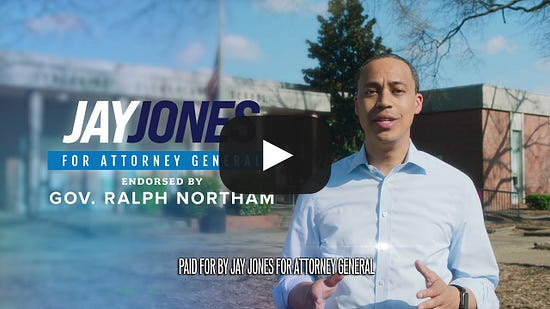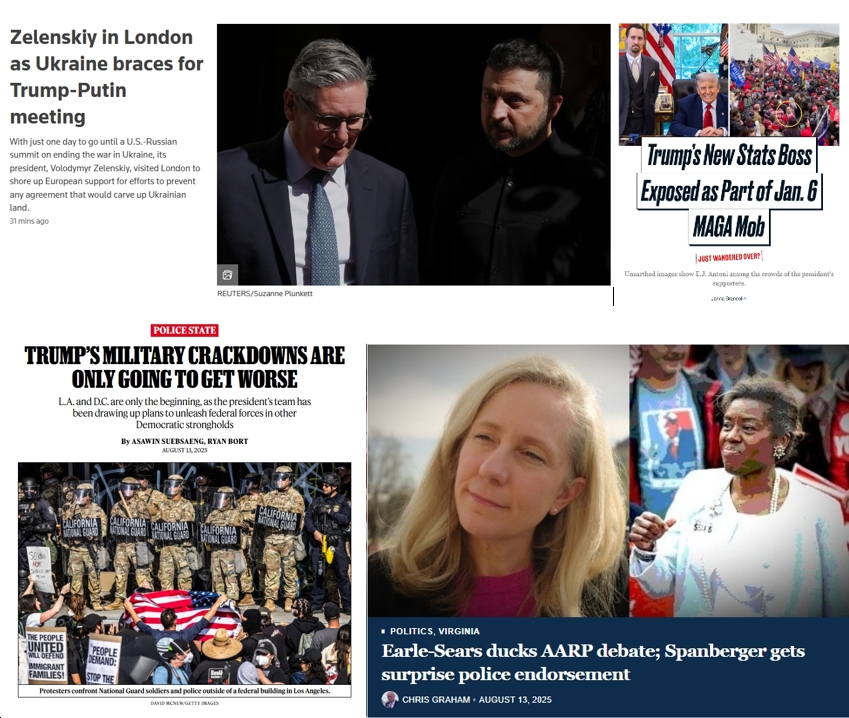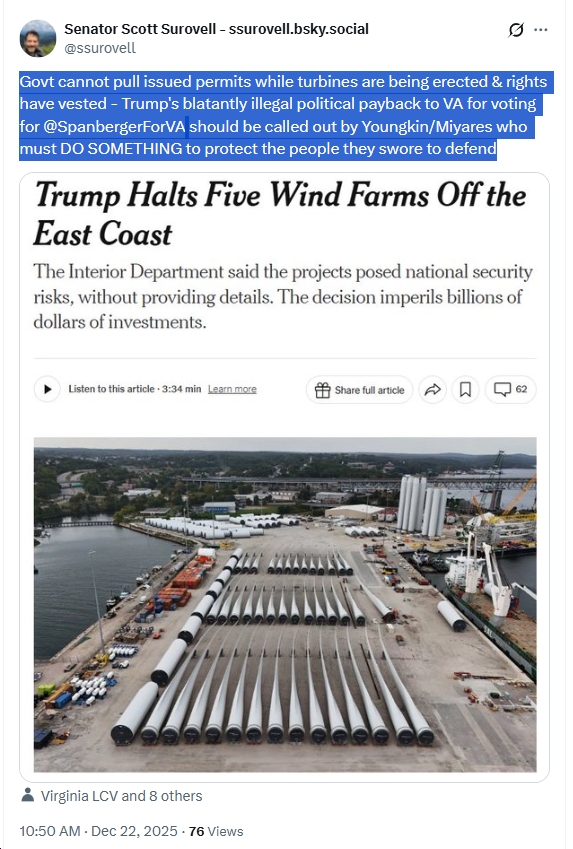Good stuff from FWIW Virginia, with just 5 days to go until Virginia Democrats head to the polls to choose our statewide nominees, as well as for a bunch of House of Delegates and local races:
The Primary Preview Edition
Also inside: A new pro-Dominion group spends big
Welcome to FWIW Virginia, where we analyze digital spending trends on both sides of the aisle in the 2021 Virginia statewide and legislative elections. Each week, we look at how campaigns are investing in digital engagement and the online tactics they use to reach voters across the Commonwealth. Was this email forwarded to you? Click here to subscribe.
The Democratic primary is just 5 days away, and candidates across the commonwealth are hustling to win over every last vote. While the gubernatorial primary seems mostly settled, the race for Lt. Governor is still wide open, and Del. Jay Jones’ primary challenge to incumbent Attorney General Mark Herring still seems viable.
Will anybody be able to chip away at McAuliffe’s lead in #VAGov? Who will break out in #VALG? And will Jones be able to pull off a shocking upset against a longtime elected official? We take a look in this week’s special primary preview edition of #FWIWVA.
But first…
2021 by the Numbers
After the Democratic primaries wrap in next week, we’ll be rolling out cumulative and weekly digital spending data in competitive elections for the House of Delegates and statewide offices. In the meantime, we’ll be sharing the data on the top spenders in the Commonwealth and on the statewide Democratic primaries.
FWIW, here’s the top 10 spenders on Facebook in Virginia this week:
Notably, Terry McAuliffe and Mark Herring were the top spenders in Virginia-targeted spending on Facebook this week, giving them an advantage when it comes to reaching voters before their respective primaries on Tuesday.
Another notable advertiser is Power for Tomorrow, which was the 8th highest spender on Facebook in Virginia this week. The organization is relatively new, with its page being created on March 17th and running its first ads in mid-April. Despite portraying itself as a national organization on its website, the organization has run Facebook ads exclusively targeting Virginia. Moreover, their ads have explicitly attacked the progressive environmental group Clean Virginia, which advocates for greater regulation of energy monopoly Dominion Energy (which is also the top political donor in Virginia). The group seems to be draping itself in progressive language, but it looks suspiciously like a vehicle for Dominion to fix its reputation among progressive Virginians.
Speaking of Clean Virginia, the group has been actively spending on social media ads on behalf of their endorsed statewide candidates. Specifically, the group is targeting young voters on Snapchat in support of Del. Jennifer Carroll Foy for Governor and Del. Jay Jones for Attorney General.
Primary Preview
#VAGov
The Democratic candidates for #VAGov met for their final in-person debate on Tuesday night, and the field went after the frontrunner, former Gov. Terry McAuliffe, for being unable to rally the base in the general election. While those attacks may have been effective earlier in the race, it’s likely too little, too late. The race for the Democratic nomination for Governor once seemed like a competitive contest, but since McAuliffe jumped in the race, it’s been a one-person show. Across every channel, including digital, McAuliffe has dramatically outspent his opponents, with his campaign crossing $1 million in spending on Facebook and Google ads earlier this week.
The main alternatives to McAuliffe, Del. Carroll Foy and Sen. McClellan have each raised $4.7 million and $2.7 million, respectively, through May 27th, but have been unable to match McAuliffe’s $12.8 million haul this cycle. McAuliffe has strongly benefitted from a divided field, with the main alternatives, Del. Jennifer Carroll Foy and Sen. Jennifer McClellan splitting resources and votes in their bids to wrestle the nomination away from the well-known former Governor. Even with the race looking very uphill, both the Carroll Foy and McClellan campaigns are still organizing and running through the finish line, hosting GOTV canvass events throughout the commonwealth.
Meanwhile, Lt. Gov Justin Fairfax polled in 2nd place with 8% of the primary vote in the last public poll of the race from mid-April, but has raised just over $300,000 – his name ID and demonstrated support make it possible he could finish 2nd or 3rd, but the credible accusations of assault and lack of resources make his path to victory unviable. Rounding out the field is socialist Del. Lee Carter, who has raised almost no money to introduce himself to voters outside of his district and Twitter account – he’s to the left of the Virginia Democratic electorate as is, and the complete lack of resources means he’ll be lucky to crack low-to-mid single digits on election night.
#VALG
As we covered in last week’s edition, the race for the Lt. Gov nomination is the most wide open of the three statewide contests – Del. Sam Rasoul has been the frontrunner throughout, but Del. Hala Ayala has picked up the endorsements of Gov. Ralph Northam and Speaker Eileen Filler-Corn. In a downballot race that takes a backseat to the race for Governor, being able to raise money and spend it effectively to boost name ID is the name of the game, and digital ads are one of the best ways for candidates to get their names in front of voters for as little as possible.
Throughout the campaign, Del. Sam Rasoul has invested early and often in digital, spending over 3x as much on Facebook and Google ads as the rest of the field combined. Although this is reflective of the campaign’s priorities, it also reflects the resource gap among the campaigns, with Rasoul leading the pack with $1.8 million raised as of May 27th. With the clock winding down, campaigns have started to get desperate for cash to reach voters tuning in late in the game, leading to some… interesting campaign finance decisions.
 Blue Virginia @bluevirginia
Blue Virginia @bluevirginiaIt’s striking, btw, that Ayala took $100k from Dominion this reporting period after receiving $25k in July 2020 from anti-Dominion group Clean Virginia, and also signing a pledge not to take money from Dominion…  Final, Pre-VA-Dem-Primary Campaign Finance Reports Coming In…I’m going to use this post as place to put all the April 1-May 27 Virginia fundraising data and press releases as they come in. Note that these will be the final campaign finance reports prior to thbluevirginia.us
Final, Pre-VA-Dem-Primary Campaign Finance Reports Coming In…I’m going to use this post as place to put all the April 1-May 27 Virginia fundraising data and press releases as they come in. Note that these will be the final campaign finance reports prior to thbluevirginia.us
Notably, Del. Hala Ayala took $100,000 from Dominion Energy this reporting period after taking $25,000 from anti-Dominion group Clean Virginia and signing a pledge to turn down Dominion donations – it makes sense to go all out after giving up your Delegate seat to run statewide, but… wow.
This race is truly still wide open, with Del. Sam Rasoul’s campaign seemingly doing everything right, but the weird influx of late money into the race from corporations and personal contributions could lead to some unpredictable shakeups in a race with almost no public polling. Short of any much bigger surprises on Tuesday, this should be a race to watch.
Attorney General
The last race on the statewide ballot is for Attorney General, where Del. Jay Jones is running an uphill primary challenge against longtime AG Mark Herring, who is running for a third term. Name ID and incumbency advantage favor Herring, as the last public poll of the race from mid-April showed Herring leading Jones 42%-18% with 39% undecided.
In recent weeks, Herring has significantly stepped up his digital operation, outspending Jones over the past two weeks, spending primarily on persuasion ads to reintroduce himself to the Democratic electorate. Jones, on the other hand, has been more consistent, investing earlier in digital persuasion as he had the challenge of introducing himself to a statewide electorate for the first time and establishing contrasts with Herring.

Herring’s late digital push seems focused on countering Jones’ attacks, reintroducing himself to voters as a successful AG with numerous progressive accomplishments, and touting his Washington Post endorsement, which typically carries significant weight with Democratic primary voters in Northern Virginia.
Interestingly, Herring has widened his financial gap with Jones, with Herring raising a total of $3.1 million to Jones’ $1.95 million as of May 27th – most of that gap comes from contributions from the Democratic Attorneys General Association, chipping in over $800,000 to Herring in the most recent filing period. While Herring’s financial advantage further complicates a tough path to victory for Jones, it’s far from the type of financial advantage that an incumbent could typically use to bury a primary challenger – Herring is still favored, but his renomination is far from guaranteed.
Thanks for reading this week’s FWIW Virginia! We’re so excited to be back following these critical elections in the Commonwealth. If you enjoy reading this type of content each week, we hope you’ll support our work by clicking share and tweeting out this newsletter below! As always, email us with ideas of what you’d like us to dive into next.
You can also sign up to receive our national newsletter, FWIW, here.


























